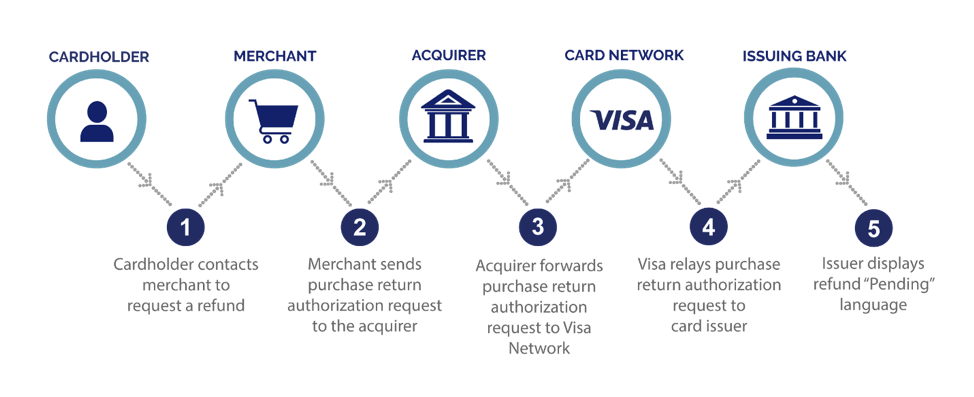
Effective October 19, 2019, Visa will require merchants in the US, Canada, and Latin America and the Caribbean (LAC) to perform a purchase return authorization on each cardholder refund prior to settlement. In turn, issuers are required to make these pending refund authorizations visible to customers via online banking and mobile applications, driving transparency to customers when a refund is in process.
It’s Visa’s intention that increased visibility to pending refund authorizations will give customers confidence that the returned funds are on their way back to them. The initiative could greatly enhance the customer experience and reduce unnecessary merchant inquiries and disputes.
Prior to this mandate, the widely adopted process for purchase refunds was for a merchant to submit their refunds directly for settlement in a daily batch file. Refunds could take several days to complete, slowly moving in process as the refund flows from the merchant to their acquirer and to the issuing bank, taking days for the customer to receive the funds. By submitting an authorization request on a purchase return prior to settlement, merchants can equip the issuer and customers with almost immediate visibility to a pending refund, so customers know their refund request is in process and the funds are on the way.

Benefits of the Visa Purchase Return Authorization
Introducing the authorization process for refunds provides increased visibility for all parties. Only through collaboration can such visibility be achieved.
- Better customer experience
- Better visibility for all stakeholders involved in a purchase refund
- May reduce unnecessary disputes through customer recognition of refunds in online banking channels
Suggested Best Practices
Confirm that your acquirer or gateway provider has made the required changes to implement the Visa refund authorization processing by October 19, 2019, and make any adjustments to your refund process that may be required.
What to Do When a Purchase Refund Authorization Is Declined
Why would a refund authorization be declined? Sounds counterintuitive, when the merchant is trying to return funds to their customer, right? Below, we’ve outlined best practices to help you identify opportunities to remedy declined transactions and maximize your refund authorizations.
Understanding the various decline codes is crucial in devising an accurate action plan, should a refund get declined at the point of authorization.
NOTE: Not every acquirer will map to these decline codes exactly as defined by Visa, and they may be returned to merchants as different responses. Confirm with your acquirer how their defined values correspond to Visa’s decline codes.
| Response Code(s) | Description | Suggested Merchant Action |
| 14 | Invalid Account Number or Account Type | Request alternative Visa Card to perform the refund or, if this is not available, perform refund using another method. |
| 39, 52, 53 | Invalid Account Type | Verify that the customer has selected the correct account type (credit or debit) on the POS device. |
| 54 | Card Expired | Inform customer that the card is expired and ask the customer if a replacement card is available to re-perform the refund. Otherwise, ask for an alternative Visa Card or, if this is not available, perform the refund using another method. |
| 55 | Invalid PIN | Perform normal Online PIN re-try processing. |
| All other decline codes | Declined | Ask for an alternative Visa Card, or, if this is not available, perform the refund using another method. |
In the event of a decline, it is the merchant’s responsibility to contact the cardholder to obtain an alternate method of payment to deliver the refund. It’s important that merchants are proactive in communications to customers in confirming the purchase refund attempt, and have alternative messaging – via email, phone scripts, text message, or through other communication media – should the attempt be declined. Communications should be documented in the merchant’s systems to provide continued visibility to readily answer customer inquiries and avoid disputes.
If the merchant is required to refund the customer via an alternate method of payment and a dispute is raised on the particular sale, the merchant must have access to clear, compelling evidence to demonstrate in the dispute response that they have successfully refunded the sale via an alternative card belonging to the cardholder.
Additional Considerations for the Mandate
Visa will be incorporating these supplemental guidelines in 2020:
- Starting April 2020, Visa will expand its Visa Claims Resolution (VCR) initiative to contain a new dispute right for issuers, where a dispute can be filed if a refund transaction is processed without proper authorization through the 11.3 reason code. This new dispute right will serve as a means of enforcement to ensure all parties are collaborating on refunds.
- In addition to the new dispute right, Visa will begin implementing non-compliance fees, also identified as “Visa Misuse and Zero Floor Limit Fees,” on July 1, 2020. These fees will be applied to all settled refund transactions identified without an accompanying authorization.
NOTE: Every time a merchant initiates a transaction that requires an authorization, they are charged authorization fees, generally through the payment processor. Given the refund process change, merchants will need to submit additional authorization requests. With additional authorization requests comes the potential for more authorization fees. Contact your acquirer directly to confirm how this will impact your business.
Visa is launching its Purchase Return Authorization mandate as another collaboration initiative to better-inform customers, merchants, and issuers. Submitting refunds through the standard authorization process will help direct visibility of pending refunds to the issuer and customers, boosting awareness and reducing inquiries and disputes.
We’re Here to Help
Verifi has been a leading expert in the payment space since the launch of our first collaboration solution, Cardholder Dispute Resolution Network™ (CDRN®), in 2007. Please contact us if you have any questions regarding the upcoming mandate.